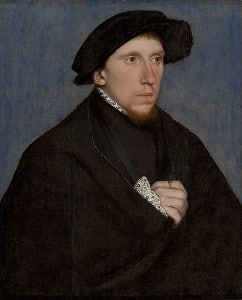 On this day in history, on the night of 21 January 1543, there was trouble in London. A group of half a dozen young men, including ringleader Henry Howard, Earl of Surrey (the famous, Tudor poet, courtier and soldier), and Thomas Wyatt the Younger (son of the poet Thomas Wyatt, and the future leader of Wyatt’s Revolt) went on a five hour rampage smashing windows, shooting prostitutes using stonebows, and shouting obscenities.
On this day in history, on the night of 21 January 1543, there was trouble in London. A group of half a dozen young men, including ringleader Henry Howard, Earl of Surrey (the famous, Tudor poet, courtier and soldier), and Thomas Wyatt the Younger (son of the poet Thomas Wyatt, and the future leader of Wyatt’s Revolt) went on a five hour rampage smashing windows, shooting prostitutes using stonebows, and shouting obscenities.
The trouble lasted until 2am. The next day, a rather repentant Surrey commented to his friend, George Blagge, that he was very sorry for his actions and wished “it were undone”, but that “we will have a madding time in our youth.”
Surrey may have seen it simply as “a madding time”, but the King’s Privy Council took the violence seriously and witnesses were examined. It was taken particularly seriously because the gang of men went on to break the Lenten fast, obtaining meat from an evangelical butcher. Surrey was called before a meeting of the Privy Council on 1st April 1543:
“Meeting at St. James’s, 1 April. Present : Chancellor, Russell, Hertford, Winchester, Westminster, St. John, Gage, Browne, Wingfield, Wriothesley. Business :—The earl of Surrey being charged with eating flesh and breaking windows at night with stonebows, alleged his licence for the first, and as to the stonebows admitted that he “had very evil done therein.” He was committed to the Fleet. Thos. Wiatt and young Pickering charged with the same offences, alleged their licence for the first and denied the other. Wiatt was sent to the Counter and Pickering to the Porter’s lodge.”
Surrey was soon out of prison and fighting for Henry VIII in Flanders.
Surrey’s poem “A Satire against the Citizens of London” is said to have been written while he was in Fleet Prison and is about the rampage he led:
LONDON! hast thou accused me
Of breach of laws? the root of strife!
Within whose breast did boil to see,
So fervent hot, thy dissolute life;
That even the hate of sins, that grow
Within thy wicked walls so rife,
For to break forth did convert so,
That terror could it not repress.
The which, by words, since preachers know
What hope is left for to redress,
By unknown means it liked me
My hidden burthen to express.
Whereby it might appear to thee
That secret sin hath secret spite;
From justice’ rod no fault is free
But that all such as work unright
In most quiet, are next ill rest.
In secret silence of the night
This made me, with a rechless breast,
To wake thy sluggards with my bow:
A figure of the Lord’s behest;
Whose scourge for sin the Scriptures shew.
That as the fearful thunder’s clap
By sudden flame at hand we know;
Of pebble stones the soundless rap,
The dreadful plague might make thee see
Of God’s wrath, that doth thee enwrap.
That pride might know, from conscience free,
How lofty works may her defend;
And envy find, as he hath sought,
How other seek him to offend:
And wrath taste of each cruel thought,
The just shape higher in the end:
And idle sloth, that never wrought,
To heaven his spirit lift may begin:
And greedy lucre live in dread,
To see what hate ill got goods win.
The lechers, ye that lusts do feed,
Perceive what secrecy is in sin:
And gluttons’ hearts for sorrow bleed,
Awaked, when their fault they find,
In loathsome vice each drunken wight,
To stir to God this was my mind.
Thy windows had done me no spight;
But proud people that dread no fall,
Clothed with falsehood, and unright
Bred in the closures of thy wall.
But wrested to wrath in fervent zeal
Thou hast to strife, my secret call.
Indured hearts no warning feel.
O! shameless wh*re! is dread then gone?
Be such thy foes, as meant thy weal?
O! member of false Babylon!
The shop of craft! the den of ire!
Thy dreadful doom draws fast upon.
Thy martyr’s blood by sword and fire,
In heaven and earth for justice call.
The Lord shall hear their just desire!
The flame of wrath shall on thee fall!
With famine and pest lamentably
Stricken shall be thy lechers all.
Thy proud towers, and turrets high
Enemies to God, beat stone from stone:
Thine idols burnt that wrought iniquity:
When, none thy ruin shall bemoan;
But render unto the righteous Lord,
That so hath judged Babylon,
Immortal praise with one accord.
Also on this day in history…
- 1542 – Bill of Attainder passed against Catherine Howard, Henry VIII’s fifth wife. Click here to read more about it.
- 1556 – Death of Eustace Chapuys, Imperial Ambassador at the English court from 1529-1545, at Louvain. He was laid to rest in the Chapel of Louvain College, the college he had founded. Click here to read more about Chapuys.
Notes and Sources
- LP xviii. Part 1. 327, 347
- Ryrie, Alex (2003) The Gospel and Henry VIII: Evangelicals in the Early English Reformation, p208
- Henry Howard, Earl of Surrey (1517–47). The Poetical Works. 1880, www.bartleby.com/256/44.html
- The poems of Henry Howard, earl of Surrey, ed. by sir N.H. Nicolas, xxvii